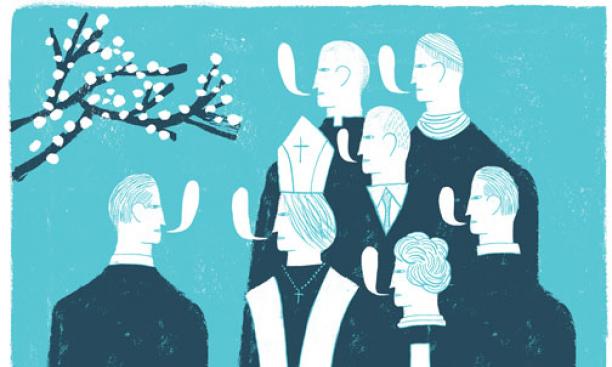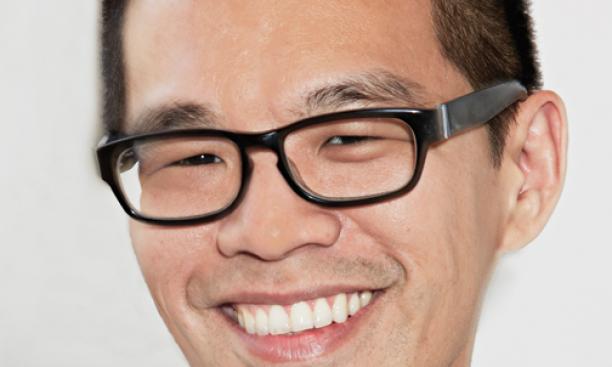

“Be humble.”
The two-word text message arrived on a summer morning in 2005, when I was at my parents’ house in Nevada. I had flown out from New York for a long weekend, my first visit since coming out as gay to my family a couple months before.
My devoutly Evangelical parents had responded badly to my revelation — I was told I needed to be more obedient to the Scriptures, make better choices, pray more — and many of my friends thought the trip was a terrible idea. One delivered a particularly impassioned monologue, ridiculing my parents’ Southern Baptist faith with a ferocity that made him sound, ironically, like a Southern Baptist preacher. The come-from-Jesus moment was when he urged me to boycott my family “until they accept you for who you really are.”
Against that backdrop, this strange two-word text jolted me. I read it over and over, closing it and then opening it up again.
“Be humble.”
The sender: my new boyfriend.
The walls of the 49th Street subway station in Midtown Manhattan are brick, glazed a garish orange-red that always has made me think of the flames of hell. In the months after my coming-out, I’d stand on the platform each evening, fretting over the fate of my soul and thinking about whether — and how much — I’d screwed up.
My train home couldn’t come soon enough, and some evenings, I meant that with a particular finality. I didn’t want any more conversations with atheist friends, who looked at me pityingly and asked why I didn’t just ditch all this God nonsense. I didn’t want any more interrogations from the super-religious, quoting Bible verses and questioning the “choices” I’d made. Maybe, I thought, it might be better to jump in front of the R train, not on it. But I never did, because I feared I might fail at that, too.
Instead, I stumbled along, hoping that I could find an on/off switch for my faith. It’s funny, but the one thing I didn’t do was what I do every day as a journalist: ask for others’ stories. So, in 2011, I embarked on a yearlong journey across America and across the theological spectrum, gathering testimonies for a book about the messy intersection of Christianity and sexuality. As a person of (some) faith, I sought to understand why the church I grew up in is so divided on this issue, and as a secular journalist, I wanted to untangle the religious roots of battles over gay rights.
I met with gays and lesbians who had grown up in the church but left it. I visited families who have reconciled the issue, and singles who still seemed tortured. I questioned bishops who have spent decades studying and debating the Scriptures. I quizzed people who have followed their hearts and their consciences in all different directions, from a gay evangelical pastor who married a woman, to a man who has chosen to be celibate for three decades, to the Episcopal Church’s first lesbian bishop.
My pilgrimage year forced me out of my own head and deep into other people’s lives. I sought out places that would make me uncomfortable and people who would challenge me. I found them in abundance in Topeka, Kan., where I spent four days with the members of Westboro Baptist Church, shadowing them as they picketed and ate pizza.
In a few ways, they were exactly what I expected. They showed me the workshop where they make their hateful signs, and the garage where they store hundreds of them, ready for every occasion, from a Supreme Court protest to a college bowl game — not just the well-known classics “God hates fags” and “God hates America” but also “God hates the Gators” and “God hates the Seminoles.” (Recently, they added “God hates the Chinese” to their repertoire, and I like to think I was partly responsible for that.)
But they also surprised me. Interviewing Westboro’s founder, Fred Phelps, was one of the most challenging hours of my career. To this day, I don’t know if he knew I was gay, but that factoid would have been irrelevant to him; he believes the only true Christians left on earth are his church’s 40 members, and the rest of us are damned. He preaches because he thinks it is the neighborly — even loving — thing to do. What kind of person, after all, sees others bound for the pit of hell and doesn’t try to warn them?
Phelps and I had a decent conversation. He gave me suggestions for books I should read, and discovered that we both admire John Bunyan’s The Pilgrim’s Progress. He liked the fact that my grandfather was a Baptist preacher and that I knew something about the Scriptures. At one point, Phelps looked at me almost gently and said: “I think we might be able to have a little bit of friendship.”
Friendship, even a modicum of it, wasn’t something I thought I’d find at Westboro, where I also encountered hospitality and worldliness. Phelps’ daughter Margie Phelps, a lawyer who successfully argued before the U.S. Supreme Court that the church had the right to picket military funerals, gushed about how she loved and respected Justice Ruth Bader Ginsburg. They were self-aware, even funny; when I visited one member’s house, he rattled off a long list of drink options: “Coke, Diet Coke, iced tea, juice, water ...” Then he paused for a pregnant moment. “But we don’t serve Kool-Aid. It makes people a little nervous!”
There is so much to oppose about Westboro and what they do and say, but in the end, they struck me as incredibly devoted to their families and steadfast in a faith that’s repugnant to the rest of us. They were at turns confident and insecure, likable and loathsome — in a word, human.
To see them that way, and then to hear about their God — their vengeful, angry, and hateful God — helped me. It crystallized and renewed my hope in an altogether different God, one whose love and grace are so incomprehensibly big that they can cover my fears, my mistakes, all of me — and perhaps even them.
“Be humble.”
Throughout my journey, I carried those words with me. They were my touchstone and my talisman, but I don’t think I knew what they meant until I meditated on them.
I see humility now as a child of grace and a mother of empathy. It has helped me stay gentle when faced with hate, grounded when met with hostility. (Indeed, the very roots of the word “humble” go back to the Latin humus — ground.) It has opened doors into people’s stories in a way that would have been impossible if I’d been defensive and not genuinely inquisitive. It has helped me to grow.
Sometimes I wonder what our discourse about homosexuality and Christianity — and indeed all manner of controversial issues, not just in churches but also in broader society — might be like if we approached them with a touch more humility and a bit less bravado. Do we mistake being humble for being weak? Do we see it as spinelessness?
Since my book’s publication, my inbox frequently has filled with emails from across the theological spectrum. Many expressed support — and their own doubts on these heartrending issues. But in many more, I’ve been called a fool, both by those who assert that it’s impossible to be gay and godly as well as by those who are convinced that there is no God. I’ve been diagnosed as demon-possessed. I’ve been deemed a sad sack of magical thinking.
Once, I coveted their kind of certainty. Once, I would have been more wounded, more shaken, by their words. No longer. My footing is firm. I’ve made peace with my questions. I’m happy to seek stories. I love my God. And I’ve slowly grown to be able to say, with hope and without fear, “I don’t know.”
As for the boyfriend who sent me that text message: A few months after I finished writing the book, he became my husband.

Jeff Chu ’99 is the author of Does Jesus Really Love Me? A Gay Christian’s Pilgrimage in Search of God in America.
